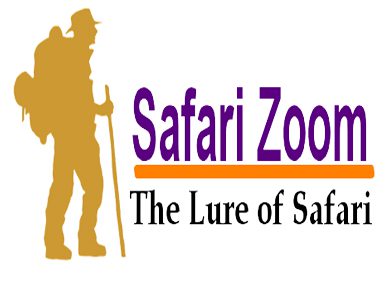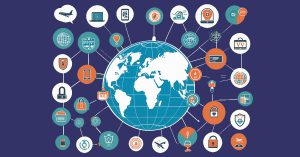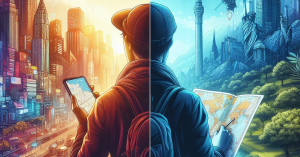How Technology is Transforming Travel and Tourism: Trends, Opportunities, and Challenges
The travel and tourism industry is one of the largest industries in the world, generating billions of dollars in revenue each year. With the advent of new technologies, the industry is experiencing a significant transformation that is changing the way people travel and experience new destinations. From artificial intelligence to virtual reality, emerging technologies are providing new opportunities for the travel and tourism industry to innovate and improve the traveler experience.
One of the most significant trends in the travel and tourism industry is the use of emerging technologies to enhance the traveler experience. For example, many airlines and hotels are using chatbots and virtual assistants to provide personalized recommendations and assistance to travelers. Virtual reality is also being used to provide immersive experiences that allow travelers to explore new destinations before they even arrive. These technologies not only improve the traveler experience but also help to increase customer loyalty and satisfaction.
Despite the many opportunities that emerging technologies provide, the travel and tourism industry faces significant challenges. One of the biggest challenges is the need to balance the use of technology with sustainable travel and ecotourism. As the industry continues to grow, it is essential to ensure that travel is sustainable and does not have a negative impact on the environment or local communities. Additionally, the industry must also address issues such as over-tourism and the need to provide safe and secure travel experiences.
Key Takeaways
• Emerging technologies are transforming the travel and tourism industry, providing new opportunities to innovate and improve the traveler experience.
• The use of chatbots, virtual assistants, and virtual reality is becoming increasingly popular in the travel industry to enhance the traveler experience.
• The travel and tourism industry must balance the use of technology with sustainable travel and ecotourism, as well as address challenges such as over-tourism and the need for safe and secure travel experiences.
Emerging Technologies in Travel
Artificial Intelligence and Machine Learning
Artificial Intelligence (AI) and Machine Learning (ML) are transforming the travel and tourism industry by providing personalized experiences to travelers. AI-powered chatbots, voice assistants, and recommendation engines are becoming increasingly popular among travel companies, enabling them to interact with customers more efficiently and effectively. For instance, chatbots can provide 24/7 customer support, answer frequently asked questions, and help travelers book their trips. AI-powered recommendation engines can suggest personalized travel itineraries based on traveler preferences, past behavior, and real-time data.
Machine learning algorithms are also used to optimize pricing strategies, demand forecasting, and revenue management. By analyzing historical data and real-time market trends, ML algorithms can help travel companies to set optimal prices for flights, hotels, and other travel products, maximizing their revenue and profitability.
Virtual and Augmented Reality
Virtual Reality (VR) and Augmented Reality (AR) are transforming the way travelers experience destinations and attractions. VR technology enables travelers to explore destinations virtually before booking their trips, providing a more immersive and engaging experience. For instance, some travel companies are using VR to showcase hotels, resorts, and cruise ships, enabling travelers to experience the facilities and amenities before making their booking decisions.
AR technology is also being used to enhance the travel experience by providing real-time information and context about destinations and attractions. For instance, AR-enabled mobile apps can provide travelers with information about landmarks, historical sites, and cultural events, enhancing their understanding and appreciation of the destination.
Blockchain Applications
Blockchain technology is transforming the travel and tourism industry by providing a secure and transparent platform for transactions. By using blockchain-based payment systems, travel companies can eliminate intermediaries, reduce transaction costs, and enhance the security of transactions. For instance, some travel companies are using blockchain-based payment systems to enable travelers to book flights, hotels, and other travel products using cryptocurrencies such as Bitcoin and Ethereum.
Blockchain technology is also being used to enhance the security and privacy of customer data. By using blockchain-based identity verification systems, travel companies can eliminate the need for customers to provide personal information multiple times, enhancing their privacy and security.
Additionally, blockchain-based loyalty programs can provide travelers with more transparent and flexible rewards, enhancing their loyalty and engagement with travel brands.
Overall, emerging technologies such as AI, ML, VR, AR, and blockchain are transforming the travel and tourism industry by providing more personalized, immersive, and secure experiences to travelers.
Enhancing Traveler Experience
Personalization Through Big Data
One of the biggest advantages of technology in the travel and tourism industry is the ability to personalize the traveler experience. With the help of big data analytics, travel companies can collect valuable information about their customers’ preferences, behaviors, and interests. They can use this data to create customized travel packages, recommendations, and promotions that are tailored to each individual traveler’s needs.For example, a hotel chain can use data analytics to understand which amenities are most important to their guests, such as free Wi-Fi, a gym, or a pool. They can then use this information to create personalized offers and promotions that are more likely to appeal to each guest.
Mobile Integration and IoT.
Mobile integration and the Internet of Things (IoT) are also transforming the way travelers experience their trips. With the increasing use of smartphones and other mobile devices, travelers expect to be able to access information and services on-the-go.For example, airlines can use mobile apps to provide real-time flight updates, boarding passes, and baggage tracking information. Hotels can use IoT technology to offer smart room features, such as automated lighting and temperature control, that can be controlled through a mobile app.
Mobile integration and IoT can also help travel companies to streamline their operations and provide a more seamless experience for their customers. For example, airports can use IoT sensors to track luggage and optimize baggage handling processes, reducing the risk of lost or delayed baggage.
Overall, the use of technology in the travel and tourism industry is helping to enhance the traveler experience in a variety of ways. By leveraging big data analytics, mobile integration, and IoT, travel companies can create more personalized, convenient, and efficient travel experiences for their customers.
Sustainable Travel and Ecotourism
As the world becomes increasingly aware of the impact of tourism on the environment, sustainable travel and ecotourism have become more popular. These forms of travel focus on minimizing the negative impact on the environment and local communities while promoting conservation efforts and cultural preservation.
Green Technologies
Technology has played a significant role in promoting sustainable travel and ecotourism. For instance, mobile applications and websites offer eco-friendly travel options, including carbon-offsetting programs, eco-lodges, and green transportation. Travelers can use these technologies to make eco-friendly choices every step of the way through the simple tap of a screen.
Moreover, green technologies such as renewable energy, electric vehicles, and energy-efficient buildings have become more prevalent in the tourism industry. These technologies help reduce carbon emissions and promote sustainable practices. For example, some hotels and resorts have installed solar panels, wind turbines, and geothermal systems to generate clean energy.
Impact on Local Communities
Sustainable travel and ecotourism also have a positive impact on local communities. These forms of travel promote cultural preservation, support local businesses, and create jobs. For instance, ecotourism provides opportunities for local communities to showcase their cultural heritage, traditional practices, and natural resources.
Sustainable travel and ecotourism encourage responsible tourism practices, such as respecting local customs, traditions, and the environment. This, in turn, helps to preserve the cultural and natural heritage of the destination.
In conclusion, sustainable travel and ecotourism are transforming the tourism industry by promoting responsible tourism practices, conservation efforts, and cultural preservation. The use of green technologies and eco-friendly travel options is helping to minimize the negative impact of tourism on the environment. Additionally, sustainable travel and ecotourism have a positive impact on local communities by promoting cultural preservation and supporting local businesses.
Challenges Facing the Travel Industry
The travel industry is facing numerous challenges in the wake of technological advancements. The following are some of the most significant challenges the travel industry is facing:
Data Security and Privacy
Data security and privacy are two of the most pressing issues facing the travel industry. With the increasing use of technology in the industry, there is a growing risk of cyber attacks and data breaches. The travel industry collects and stores vast amounts of sensitive data, including personal and financial information of travelers. Therefore, it is crucial for the industry to implement robust data security measures to protect this information from unauthorized access, theft, and misuse.
Regulatory Compliance
The travel industry is subject to a wide range of regulations and laws, including those related to safety, security, and privacy. Compliance with these regulations is critical for the industry to operate legally and ethically. However, the complexity and constantly evolving nature of regulations make it challenging for the industry to keep up. Failure to comply with these regulations can result in significant fines, legal action, and reputational damage.
Adapting to Tech Advancements
The rapid pace of technological advancements presents a significant challenge for the travel industry. The industry must continually adapt to new technologies to remain competitive and meet the evolving needs of travelers. However, this can be challenging, particularly for smaller businesses with limited resources. The industry must also balance the benefits of new technologies with the potential risks and costs of implementation.
The travel industry is facing several challenges related to data security and privacy, regulatory compliance, and adapting to tech advancements. The industry must address these challenges proactively to ensure that it can continue to thrive in the future.
Conclusion
The travel and tourism industry is undergoing a transformation due to the rapid advancement of technology. As discussed in this article, the trends, opportunities, and challenges presented by technology are numerous and far-reaching.
One of the most significant trends is the use of Artificial Intelligence (AI) in the travel industry. AI is being used to personalize travel experiences, optimize pricing, and improve customer service. This technology has the potential to revolutionize the industry by providing a more efficient and enjoyable experience for travelers.
Another trend is the use of mobile technology, which allows travelers to book flights, hotels, and activities on the go. Mobile apps also provide real-time updates on flight status, gate changes, and delays, making travel more convenient and less stressful.
The rise of social media has also transformed the travel industry. Travelers can now research destinations, read reviews, and share their experiences with others. Social media has also given rise to a new type of traveler, the “influencer,” who can have a significant impact on travel trends and destinations.
Despite the opportunities presented by technology, the industry also faces challenges. One of the most significant challenges is cybersecurity. As the industry becomes more reliant on technology, it also becomes more vulnerable to cyber attacks. Travel companies must invest in cybersecurity measures to protect their customers’ personal and financial information.
Another challenge is the impact of technology on employment. As technology automates many tasks, it also reduces the need for human workers. This can have a significant impact on local economies that rely on tourism for employment.
The travel and tourism industry is in the midst of a technological revolution. While the opportunities presented by technology are vast, the industry must also address the challenges presented by cybersecurity and employment. As technology continues to evolve, the industry must adapt to remain competitive and provide travelers with the best possible experience.




